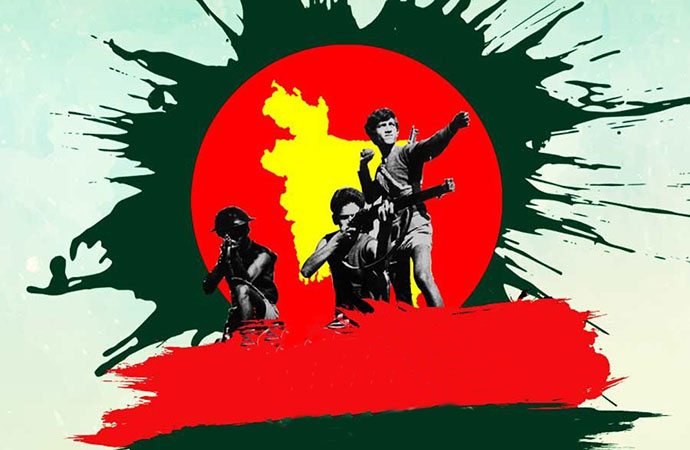“Many people are not aware of what happened in 1971 and the crimes that were committed on East Pakistan, by the then West Pakistan army, the Bangladeshi genocide, millions were killed, those were terrible war crimes.” – Mr Amish Tripathi, renowned author, columnist and Director of the Nehru Centre London, during a webinar conducted on May 31, 2021
Bangladesh, this year is going to celebrate its 50 years of Independence and liberation, but the 1971 War still remains a unique saga in human history. The war waged on the citizens of East Pakistan (now Bangladesh) was not merely a result of political greed but was the result of friction between the two cultures, aggravated by the assumed “cultural superiority” of a few elites of West Pakistan. The war and the ensuing genocide that burned East Pakistan resulted in approximately 3 million murders, 2 lakh rapes, countless refugees and billions emotionally affected.
As all wars do this war not only took toll on Bengali people but also left a profound impact on various artists of the world. In fact, the War still remains significant for a lot of people and many till date are trying the decode various aspects of the war.
The year 1971 has many stories to tell. Here are some artistic pieces by great artists of different fields which can help you deeply understand the sufferings of the Bangladeshi people during the 1971 War.
1. George Harrison & Ravi Shankar Concert for Bangladesh
In August 1971, former Beatles’ guitarist George Harrison, and Pandit Ravi Shankar from India with other well-known musicians took to stage in New York’s Madison Square Garden for “The Concert for Bangladesh”. The concert was performed in 1971 to raise funds and awareness for the crisis that Bangladeshi people were suffering.
The Concert for Bangladesh is believed to be the first of its kind as it was performed when the culture of charity concerts was quite unknown to people and became a model for future charity events in the West. The concert was a huge success and raised a fund of about $12 million for Bangladesh, while 40,000 people attended the concert back then.
As India and Bangladesh are going to celebrate the 50th Anniversary of the Bangladesh Liberation War this year, India announced that it will be organising the famous “Concert for Bangladesh” yet again later this year. The concert will be led by Dhani Harrison and Anoushka Shankar, the son, and daughter of the original “stars” of the concert–George Harrison and Ravi Shankar.
2. Muktir Gaan: The Song of Freedom
Muktir Gaan is a historic Bangladeshi documentary movie directed by the filmmaking duo Tareque Masud and Catherine Masud. The movie clearly depicted the impact of cultural identity on the freedom movement of Bangladesh in the year 1971. The documentary tells the true story of a troupe of singers travelling through the refugee camps and zones of war during the Bangladesh Liberation War in 1971.
The two filmmakers combined the footage of the cultural troupe and their activities, shot by American filmmaker Lear Levin in 1971, with historic footage collected from archives around the world, to create “Muktir Gaan” (Song of Freedom).
3. Children of War: Nine Months to Freedom
Children of War is a 2014, 150-minute feature film based on the “struggles” to establish Bangladesh. The film specifically picturised the mass genocide and the rape and torture of women that happened in 1971, which resulted in many orphans who never knew their real parents. The film depicts the traumatic experience that the people of Bangladesh suffered during those nine months which led them towards their freedom.
“India did the moral thing in helping our friends, the Bangladeshis to get liberation, against the horrific oppression inflicted by West Pakistan,” says Mr Amish Tripathi, during a webinar conducted on May 31, 2021. This film too looks at India’s moral role while focusing largely on the war crimes and how women were used as the weapon of war by the Pakistani Army.
4. September on Jessore Road
“September on Jessore Road” is a poem by American poet and activist Allen Ginsberg that shook the world in 1971. The poem for the first time was published in ‘The New York Times’ and was inspired by the plight of the East Bengali people during the Bangladesh Liberation War of 1971.
The 152 lines poem was composed by Allen Ginsberg, after he visited the War victims of East Pakistan, now Bangladesh, on Jessore road personally in September 1971. The poem “September on Jessore Road” greatly touched Ginsberg friend Bob Dylan, the great Pop singer of the world who gave the poem a musical form and presented it in Bangladesh afterwards.
You can listen the poem here.
5. Bhuban Majhi
Bhuban Majhi is a Bangladeshi film based on the Liberation War of 1971. Directed by Fakhrul Afreen Khan, the film depicts a wartime romance spanning four decades simultaneously from 1970 to 2013. The film opens in 1970, showcasing the rise of a rebel in a common man, who struggles with his ideals, and ends with the philosophy of Baul Ananda Shai in 2013.
6. Heroes of 71: Retaliation and Mukti Camp
Bangladesh-based entrepreneurs Masha Mustakim and Zamil Rashid in 2018 came up with the idea of building a video game with the theme based on Bangladesh’s War of Liberation. The third-person shooting game depicts the freedom struggle of 1971 that ended in the separation of present-day Bangladesh from Pakistan.
7. A Golden Age
A Golden Age is a brilliant novel by Bangladeshi-born writer Tahmima Anam. The novel tells the story of the 1971 war through the eyes of one family. It was awarded the prize for Best First Book in the Commonwealth Writer’s Prize 2008. A Golden Age was also shortlisted for the 2007 Guardian First Book Award.

